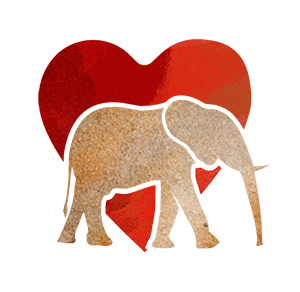On the 23rd August 2017, visitors to Tsavo East came across a calf collapsed and barely breathing along the Voi river circuit. The drought in the southern sector of Tsavo has really hit wildlife hard, particularly the elephants that have remained in that area, with many Mums’ and their calves succumbing to the dry conditions, because while water remains it’s the scarcity of food that is the challenge. Sadly the mothers with young calves have been unable to travel the distances required to find better browse, so choose to remain anchored close to water points, and because of this they are more often than not the first casualties of such brutal droughts. This area of Tsavo is experiencing one of the worst in many decades, with poor rains for two years in a row, so in the recent months we have experienced as many as 100 elephants dying from this 2017 drought in the southern area of Tsavo, and sadly numerous calves, found too late to save.
The SWT/KWS Tsavo Mobile Veterinary Unit were immediately alerted and rushed to the scene. Thankfully such prompt response managed to ensure the calf was placed on an IV drip while the SWT helicopter was mobilised to fly directly to Voi from the Trust’s Kaluku field headquarters in order to transport the calf directly to the Nairobi Nursery saving precious time. It was this rapid response that ultimately saved this little calf’s life, because in cases of drought and starvation, every hour counts.
Once our ground teams arrived at the site where he lay unresponsive but for a tiny whiff of breath coming from his trunk, and a light pulse, they set about trying to stabilize him, keeping his body covered from the unforgiving sun while IV drips were placed into his vein. His blood pressure was non-existent making even locating a vein challenging. All the while that was happening the helicopter was being prepared at Kaluku HQ, with the seats removed and all the rescue equipment loaded before take-off for Voi, a 35 minute flight from Kaluku. By the time the ground teams had stabilized the baby, loaded him and travelled to the Voi airstrip there was little delay before the helicopter was in place on the Voi airstrip. The team then set about loading him into the helicopter carefully, strapping his legs to ensure that should he stir during the flight he could not interfere with the controls. Once everybody felt confident he was comfortable, and secured well with everything in place, the aerial team of two lifted off for Nairobi, a journey that takes 1 ½ hours in a helicopter. Given how weak he was there was very little reaction to the flight, and after landing as the Nairobi keepers off loaded him there was some response.
Clearly he was going to be a very challenging case for all concerned, but there were now more hopeful signs. He was transported to Malima’s old stable and Malima was moved into a bigger stable next to Ambo, and within the comforts of the stable’s soft hay the Keepers untied his legs and helped him to his feet. Eventually we were able to lift his limp trunk enough to place water from a bucket into his mouth, and he even began to chew on the freshly cut greens hung in his stable, and sucked on a welcomed bottle of milk. With these starvation cases milk needs to be introduced slowly as they simply do not have the reserves to handle any stomach upset issues.
We named this little calf Emoli which means elephant in the Waliangulu tribal language, a tribe whose heritage has been interwoven with elephants throughout history. As the days passed we grew more hopeful of Emoli’s chances, but there were still many bouts of collapsing throughout the next eleven days that had us all scurrying to retrieve him once more, but slowly in time this emaciated calf grew stronger. He remained close to home without the strength to join the others out in the Park during the day, and very quickly became absolutely hooked on his Keepers, trailing them everywhere around the compound, longing for a finger to suck. He joined our baby herd and would accompany the little elephants along with Luggard for private mud bath sessions. In his case the Keepers would do the dust bathing for him, and douse him in welcomed soothing mud simply because even these tasks proved too difficult for him to do in the beginning. Every time he lay down he would have to be assisted to his feet, lacking the strength to do this simple task unaided. Thankfully, Emoli had a healthy appetite and we have been able to watch with great pride as his body condition has improved, and he has overcome small milestones, now able to wallow himself, and get to his feet unaided, and join the other Nursery orphans with the strength to travel further afield. A week after Emoli was saved another drought victim came into our care, this time a little girl, and these two have become inseparable and have helped heal each other.
Saving Emoli has been incredibly satisfying for everyone involved, discovering his gentle warm nature since it has been able to emerge and blossom once more from beneath the skin and bones that we were presented with two months ago. Watching his recovery and genuine happiness as he finds the strength to savour life is so gratifying, retrieved literally from his last dying breaths.
We estimate Emoli to be approximately one year old. The fate of his mother remains unknown, but we think she was forced to abandon her collapsed calf, suspecting his life had ebbed away beyond all hope.
















































